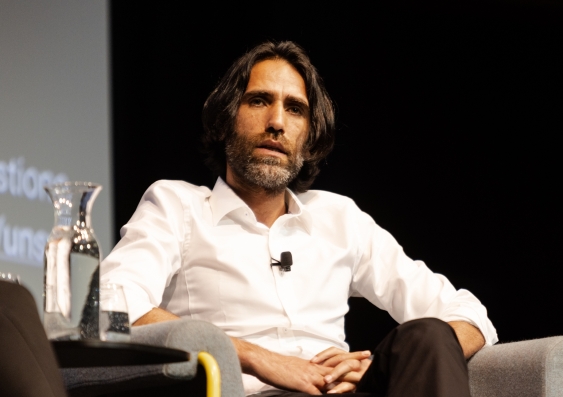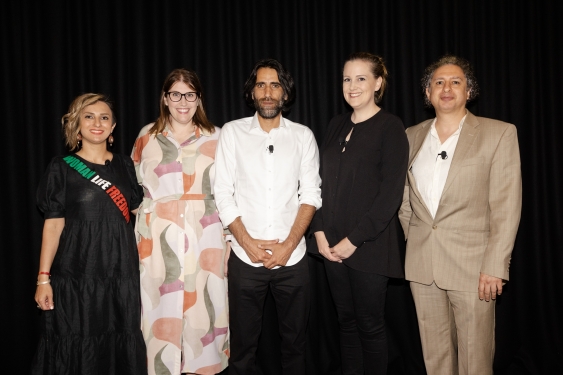Sharing a human narrative of offshore detention
Behrouz Boochani discusses how his inhumane treatment as a refugee led to his movement of 'resistance knowledge'.
Behrouz Boochani discusses how his inhumane treatment as a refugee led to his movement of 'resistance knowledge'.

Yolande Hutchinson
UNSW Sydney External Engagement
0420 845 023
y.hutchinson@unsw.edu.au
Kurdish-Iranian refugee and award-winning writer Behrouz Boochani delivered the 2022 Wallace Wurth Lecture at UNSW Sydney on Tuesday night, sharing why a human narrative is integral to fighting Australia’s current refugee policies.
Mr Boochani, who is an adjunct associate professor at UNSW, spent over six years in offshore immigration detention in Manus Detention Centre, where he and his fellow asylum seekers endured conditions that violated international refugee law.
His new book, Freedom, Only Freedom, is a collection of his prison writings, translated and edited by his long-time translators and collaborators Omid Tofighian and Moones Mansoubi. Mr Boochani's work is combined with essays from experts on migration, refugee rights, politics, and literature.
A movement of resistance knowledge, Mr Boochani said, is about radical change. It is when resistance to a system, such as detention policies, occurs through language, communication and shared experiences.
“We have witnessed a tragedy, a tragedy created by [the] Australian government. But I’m not really going to carry this tragedy with myself for the rest of my life. I think my duty, or our duty or mission is to work so that Australia acts responsibly,” Mr Boochani said.
“They banished us, they tortured us, they dehumanised us, but we fight them back. I’m here to remind the people of Australia to recognise that fight, to recognise that resistance. Through this resistance we have done with our bodies, our words, we created a resistance knowledge. Australia should learn from resistance knowledge created by refugees and people who have been working with refugees, and this book is just a part of this resistance knowledge.”
Following an introduction by Mr Tofighian and Ms Mansoubi, Mr Boochani spoke about the refugee policies that the Australian government continues to endorse.
He said his new book provides an important snapshot of offshore detention from many different perspectives and is a valuable record of these voices.
“It is a history of the policy… It’s a part of history and I’m really sorry to be saying I’m using the word ‘history’ because it still is going on,” Mr Boochani said.
During a conversation with human rights lawyer Madeline Gleeson from the Kaldor Centre for International Refugee Law at UNSW Law & Justice, Mr Boochani explained how communicating to those outside Manus Detention Centre helped him survive: the intellectual conversations brought back his dignity.
“I’ve tried to bring the humanity back, the face of refugees… Living in that context you can fight back in different ways – singing, to be creative, performance, humour, all of that challenges the system and reminds you that you are a human being.”
When asked by a member of the audience, a refugee who also lived in offshore detention, how to change the current system, Mr Boochani said refugees need to create their own discourse and challenge the image of refugees. Of the Australian government, he said: “They pretend that something has changed, but I am here to say nothing has changed.”
“There are still hundreds of people in detention… thousands of thousands of people… who have been here for more than a decade, still they don’t have a future in this country.”
Read more: Behrouz Boochani appointed adjunct associate professor at UNSW
In 2013, Mr Boochani fled his home country of Iran in search of asylum in Australia amid fears the government would imprison him for his journalism and documentary filmmaking. He was intercepted while trying to reach Australia from Indonesia by boat and taken to Christmas Island before being transferred to Manus Detention Centre.
There, he detailed his life in the camp on a contraband mobile phone and sent thousands of text messages to his translator in Sydney. The messages formed his award-winning book No Friend but the Mountains, which has won almost every major literary prize in Australia.
This event is presented by the UNSW Centre for Ideas and supported by the Kaldor Centre for International Refugee Law and the Refugee Advice & Casework Service.
UNSW Sydney has recently become the Sydney Writers’ Festival exclusive university sponsor and Premier partner, furthering its commitment to foster unique collaborations and connect with a community of like-minded, curious people.

Moones Mansoubi, Sarah Dale, Behrouz Boochani, Madeline Gleeson, Omid Tofighian. Photo: Maria Louise Boyadgis
Behrouz Boochani is a Kurdish-Iranian writer, journalist, scholar, cultural advocate and filmmaker. Boochani was a writer and editor for the Kurdish language magazine Werya in Iran. He is a Visiting Professor at Birkbeck Law School; Associate Professor in Social Sciences at UNSW Sydney; Honorary Member of PEN International; and winner of an Amnesty International Australia 2017 Media Award, the Diaspora Symposium Social Justice Award, the Liberty Victoria 2018 Empty Chair Award, and the Anna Politkovskaya award for journalism.
Omid Tofighian (Introduction) is Adjunct Lecturer in the UNSW School of the Arts & Media, and Honorary Research Fellow at Birkbeck Law, University of London. He is an award-winning lecturer, researcher, and community advocate, combining philosophy with interests in citizen media, popular culture, displacement, and discrimination.
Moones Mansoubi (Introduction) is a community, arts and cultural development worker based in Sydney. Her work is dedicated mainly to supporting and collaborating with migrants and people seeking asylum in Australia. She has managed numerous community and cultural projects, and the first translation of Behrouz Boochani’s work when he began writing from Manus Island. She was translation consultant for Boochani’s book, No Friend but the Mountains: Writing from Manus Prison.
Madeline Gleeson (Chairperson) is a lawyer and Senior Research Fellow at the Andrew & Renata Kaldor Centre for International Refugee Law at UNSW Sydney, where she directs the Offshore Processing and Regional Protection projects. Madeline specialises in international human rights and refugee law, with a focus on the law of state responsibility, extraterritorial human rights obligations, offshore processing on Nauru and Manus Island, and refugee protection in the Asia-Pacific region.
Read more: Madeline Gleeson | Offshore and Out of Mind
Sarah Dale (Host) is the Director and Principal Solicitor at Refugee Advice & Casework Service (RACS). She joined RACS in 2013 after spending several years working with people seeking asylum and refugees in visa cancellation and civil law issues. At RACS, Sarah was their first Child Specialist Solicitor, developing an outreach legal service to assist unaccompanied children seeking asylum in Australia, and worked tirelessly with children who were detained on Christmas Island and faced transfer to Nauru.